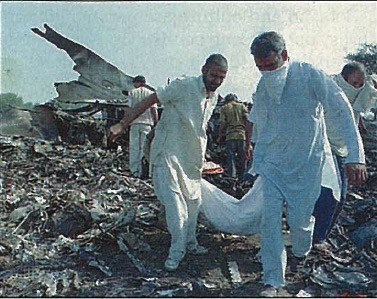We could not save any lives, but we are doing the only thing we possibly could for the dead–that’s what we are trained to do in any calamity,” RSS worker Rajesh Jangi told Reuters News Service at the site of India’s worst-ever aviation disaster. A Saudi Arabian Airlines 747 taking off from Delhi airport had collided with an arriving Kazakhstan Airlines cargo plane on November 13th, killing all 349 persons aboard the planes. Debris was spread over a large area 60 miles west of New Delhi. Cause of the crash remains undetermined, though flight recorder data will give more clues. Delhi air controllers warned both planes of their close proximity.
RSS (Rashtriya Sevak Sangh) volunteers, with saffron headbands, were among the first to arrive at the site. But they could do nothing beyond collect the bodies. Cadres brought in tractors for hauling, and ice and cloth to preserve and cover the corpses. Most of the dead were Muslims, some on pilgrimage to Mecca. “It doesn’t matter who these people are. They are human beings,” local RSS leader Jeet Ram Gupta told Reuters. Victims’ relatives expressed gratitude to the volunteers, police, army and villagers.
Ninety-four victims were still unidentified a few days later. With no way to determine their religion, the corpses were divided according to the percentage of Hindus, Muslims and Christians on the passenger lists, and burial or cremation rites performed accordingly by priests of each faith.
The oft-maligned RSS has an impressive record of service in emergencies. They marshalled thousands of volunteers in the 1993 Maharashtra earthquake and earlier major Indian disasters.
